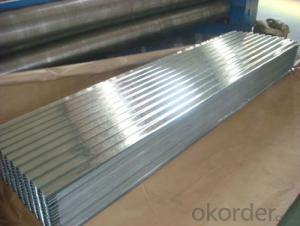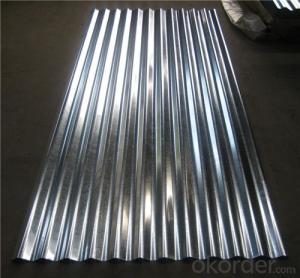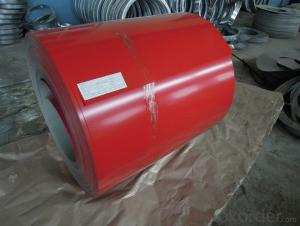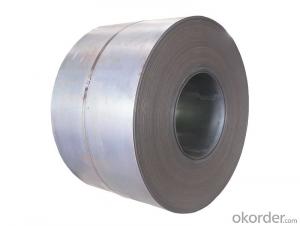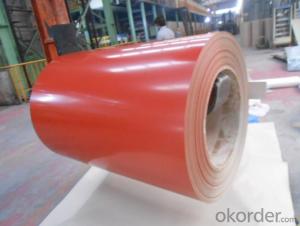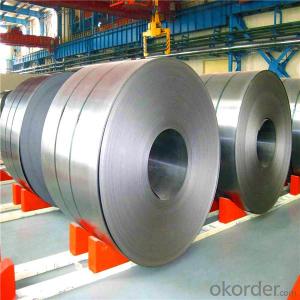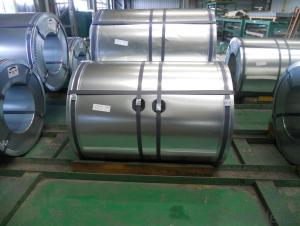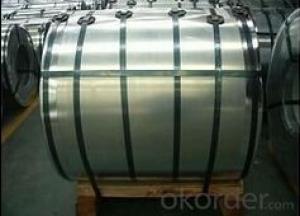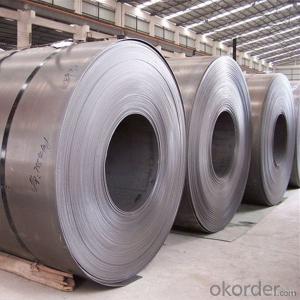Prime GI&CL Courraged Steel Sheets in High Quality
- Loading Port:
- Shanghai
- Payment Terms:
- TT OR LC
- Min Order Qty:
- 200 m.t.
- Supply Capability:
- 20000 m.t./month
OKorder Service Pledge
OKorder Financial Service
You Might Also Like
1.Structure of Galvanized Steel Coil Description:
Hot-dip galvanized steel coils are available with a pure zinc coating through the hot-dip galvanizing process. It offers the economy, strength and formability of steel combined with the corrosion resistance of zinc. The hot-dip process is the process by which steel gets coated in layers of zinc to protect against rust. It is especially useful for countless outdoor and industrial applications.
2.Main Features of the Galvanized Steel Coil:
• Base material for countless outdoor and industrial applications
• High corrosion resistance
• High strength
• Good formability
• Rust- proof ability
• Good visual effect
3.Galvanized Steel Coil Images
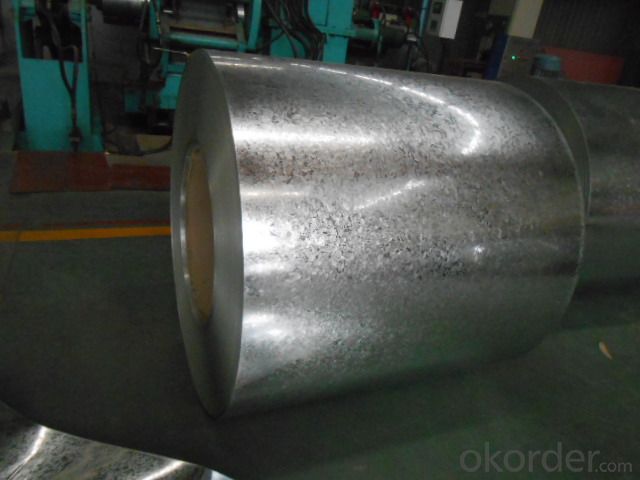
4.Galvanized Steel Coil Specification
Operate Standard: ASTM A653M-04/JIS G3302/DIN EN10143/GBT 2518-2008
Grade : SGCD,SGCH, Q195,DX51D
Zinc coating :40-180g( as required)
Width:914-1250mm(914mm, 1215mm,1250mm,1000mm the most common)
Coil id:508mm/610mm
Coil weight: 4-10 MT(as required)
Surface: regular/mini/zero spangle, chromated, skin pass, dry etc.
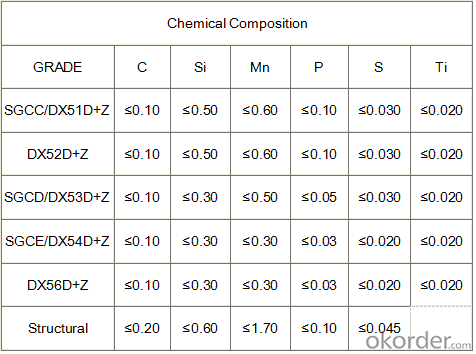
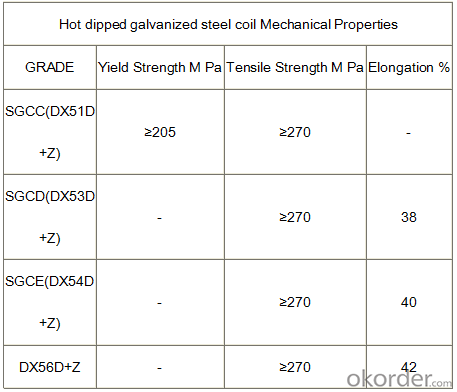
5.FAQ of Galvanized Steel Coil
We have organized several common questions for our clients,may help you sincerely:
1.How to guarantee the quality of the products?
We have established the international advanced quality management system,every link from raw material to final product we have strict quality test;We resolutely put an end to unqualified products flowing into the market. At the same time, we will provide necessary follow-up service assurance.
2. What is the minimum order quantity ?
Our MOQ is 50mt for each size. And we will consider to give more discount if you make big order like 1000 tons and more. Further more, the more appropriate payment term your offer the better price we can provide.
3.How long can we receive the product after purchase?
Usually within thirty working days after receiving buyer’s advance payment or LC. We will arrange the factory manufacturing as soon as possible. The cargo readiness usually takes 15-25 days, but the shipment will depend on the vessel situation.
- Q: What are the cost implications of using steel coils in manufacturing?
- The cost implications of using steel coils in manufacturing can vary depending on several factors. Firstly, the price of steel coils themselves can fluctuate due to market conditions, supply and demand, and global trade policies. Additionally, the cost of transporting and storing steel coils can add to the overall expenses. Furthermore, the manufacturing process may require additional equipment or specialized machinery to handle and process steel coils, which can impact the overall production costs. However, steel coils are often considered a cost-effective option in manufacturing due to their durability, versatility, and recyclability, which can contribute to long-term savings and environmental benefits.
- Q: How are steel coils used in the production of building facades?
- Steel coils are commonly used in the production of building facades as they provide strength, durability, and versatility. These coils are typically processed into flat sheets or panels and then cut, shaped, and attached to the framework of the facade. The steel coils can be coated with various finishes or paints to enhance their aesthetic appeal and protect against corrosion. Overall, steel coils play a crucial role in constructing robust and visually appealing building facades.
- Q: How are steel coils used in the manufacturing of HVAC ductwork?
- Steel coils are used in the manufacturing of HVAC ductwork as they provide strength and durability to the ducts. These coils are shaped and formed into the desired ductwork design, providing a rigid structure that can withstand the pressure and movement of air. The steel coils also ensure that the ductwork maintains its shape over time, preventing any deformation or collapse.
- Q: What are the common applications of pre-painted galvanized steel coils?
- Pre-painted galvanized steel coils have a wide range of common applications. They are commonly used in the construction industry for roofing, siding, and cladding applications due to their durability, corrosion resistance, and aesthetic appeal. These coils are also used in the automotive industry for manufacturing various parts and components. Additionally, pre-painted galvanized steel coils are utilized in the manufacturing of appliances, furniture, and storage systems.
- Q: What are the common uses of pre-painted steel coils?
- Pre-painted steel coils are commonly used in various industries such as construction, automotive, and appliance manufacturing. They are used for roofing and siding applications, as well as for making durable and aesthetically pleasing metal doors, window frames, and garage doors. Additionally, pre-painted steel coils are utilized in the production of electrical enclosures, air conditioning systems, and various other metal components that require corrosion resistance and a visually appealing finish.
- Q: How are steel coils used in the production of industrial boilers?
- Steel coils are used in the production of industrial boilers to form the main body and components of the boiler, providing strength and durability. The coils are first shaped into the desired boiler structure, such as the shell and tubes, and then welded together to create a sturdy and leak-proof vessel. Additionally, the coils are often used to manufacture the heat exchangers and other critical parts of the boiler, ensuring efficient heat transfer and reliable operation.
- Q: How are steel coils used in the production of household goods?
- Steel coils are an essential component in the production of various household goods. These coils are typically made from high-quality steel and are manufactured to specific dimensions and thicknesses to meet the requirements of different products. One of the primary uses of steel coils in household goods production is in the manufacturing of appliances such as refrigerators, washing machines, and dishwashers. The coils are used to create the body and framework of these appliances, providing strength, durability, and stability. Additionally, steel coils are often used in the production of smaller household appliances like toasters, blenders, and coffee makers. Furthermore, steel coils are also used in the production of furniture, particularly in the manufacturing of metal frames for chairs, tables, and cabinets. These coils provide the necessary support and structural integrity to the furniture, ensuring long-lasting durability. Another significant application of steel coils in household goods production is in the production of shelving units and storage solutions. Steel coils can be shaped and formed to create sturdy shelves and racks that can hold heavy items and withstand regular use. These shelves are commonly used in kitchens, garages, and storage rooms to organize and store various household items. In summary, steel coils play a crucial role in the production of household goods. They are used to create the framework, structure, and support for appliances, furniture, and storage solutions. Their strength, durability, and versatility make them an ideal material for manufacturing a wide range of household products that are designed to withstand everyday use.
- Q: What are the characteristics of hot-rolled steel coils and cold rolled steel coils? What loading and unloading tools should be used? What items should be paid attention to?
- When placing materials to roll on both sides of the main pad wood pallets, prevent rolling back and forth. In addition the floor should be thickened, cannot have uneven or debris, because the line of steel coils when gravity concentrated in contact with the ground floor, there is a fracture easily, debris, easy to leave the indentation in the steel roll.
- Q: What are the different types of steel coil cutting machines?
- There are several different types of steel coil cutting machines, including slitting machines, shearing machines, and laser cutting machines. Slitting machines are used to cut the steel coil into narrow strips, while shearing machines cut the coil into smaller, more precise lengths. Laser cutting machines use a high-powered laser beam to cut through the steel coil with extreme accuracy. Each type of machine has its own advantages and is suited for specific cutting requirements.
- Q: Is this a strong, durable piece of steel that can take abuse? I'm thinking about using it on a small project.
- If you made up the right rigging you could probably suspend a Volkswagon with that, but certainly a refrigerator. It's flexible as steel goes - it's not rigid like tool steel, for instance. Since you ask about tempering and you are shopping at Home Depot, it should be just fine for a home project, if it looks like it will suit. Building a bridge or a machine tool, no.
Send your message to us
Prime GI&CL Courraged Steel Sheets in High Quality
- Loading Port:
- Shanghai
- Payment Terms:
- TT OR LC
- Min Order Qty:
- 200 m.t.
- Supply Capability:
- 20000 m.t./month
OKorder Service Pledge
OKorder Financial Service
Similar products
Hot products
Hot Searches
Related keywords
